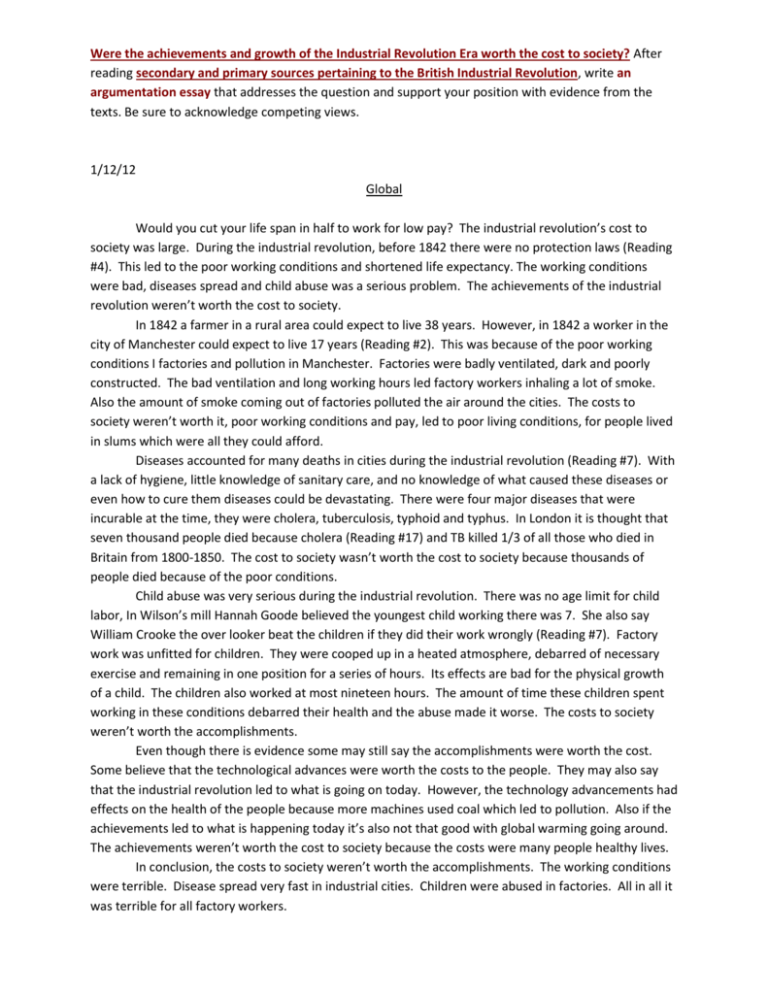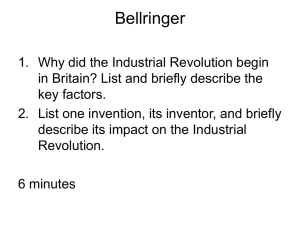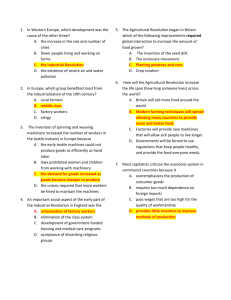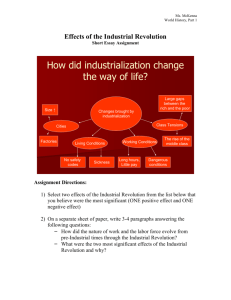Student_sample_-_industrial_revolution
advertisement

Were the achievements and growth of the Industrial Revolution Era worth the cost to society? After reading secondary and primary sources pertaining to the British Industrial Revolution, write an argumentation essay that addresses the question and support your position with evidence from the texts. Be sure to acknowledge competing views. 1/12/12 Global Would you cut your life span in half to work for low pay? The industrial revolution’s cost to society was large. During the industrial revolution, before 1842 there were no protection laws (Reading #4). This led to the poor working conditions and shortened life expectancy. The working conditions were bad, diseases spread and child abuse was a serious problem. The achievements of the industrial revolution weren’t worth the cost to society. In 1842 a farmer in a rural area could expect to live 38 years. However, in 1842 a worker in the city of Manchester could expect to live 17 years (Reading #2). This was because of the poor working conditions I factories and pollution in Manchester. Factories were badly ventilated, dark and poorly constructed. The bad ventilation and long working hours led factory workers inhaling a lot of smoke. Also the amount of smoke coming out of factories polluted the air around the cities. The costs to society weren’t worth it, poor working conditions and pay, led to poor living conditions, for people lived in slums which were all they could afford. Diseases accounted for many deaths in cities during the industrial revolution (Reading #7). With a lack of hygiene, little knowledge of sanitary care, and no knowledge of what caused these diseases or even how to cure them diseases could be devastating. There were four major diseases that were incurable at the time, they were cholera, tuberculosis, typhoid and typhus. In London it is thought that seven thousand people died because cholera (Reading #17) and TB killed 1/3 of all those who died in Britain from 1800-1850. The cost to society wasn’t worth the cost to society because thousands of people died because of the poor conditions. Child abuse was very serious during the industrial revolution. There was no age limit for child labor, In Wilson’s mill Hannah Goode believed the youngest child working there was 7. She also say William Crooke the over looker beat the children if they did their work wrongly (Reading #7). Factory work was unfitted for children. They were cooped up in a heated atmosphere, debarred of necessary exercise and remaining in one position for a series of hours. Its effects are bad for the physical growth of a child. The children also worked at most nineteen hours. The amount of time these children spent working in these conditions debarred their health and the abuse made it worse. The costs to society weren’t worth the accomplishments. Even though there is evidence some may still say the accomplishments were worth the cost. Some believe that the technological advances were worth the costs to the people. They may also say that the industrial revolution led to what is going on today. However, the technology advancements had effects on the health of the people because more machines used coal which led to pollution. Also if the achievements led to what is happening today it’s also not that good with global warming going around. The achievements weren’t worth the cost to society because the costs were many people healthy lives. In conclusion, the costs to society weren’t worth the accomplishments. The working conditions were terrible. Disease spread very fast in industrial cities. Children were abused in factories. All in all it was terrible for all factory workers.








